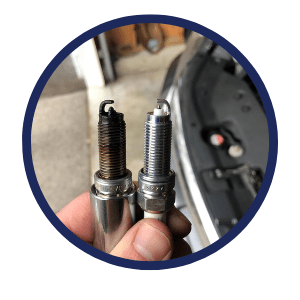Engine knocking is one of the most off-putting things that you can hear coming from a vehicle. There are a few different things that can cause it to happen in your car or truck. These would include issues with the spark plugs, bad or wrong fuel, carbon deposits, and more. Driving around with an engine that is knocking loudly can lead to a blown engine in no time.
Engine Knocking Causes
Knowing the cause of the knocking will help you identify what type of repair needs to be done. Knocking can also be caused by low oil. The FIRST thing that you should do is make sure that you aren’t running out of oil.
Before getting into the diagnosis portion, make sure that you do an OBDII scan if the check engine light is on. This scan data will give you information that can help you pinpoint the problem with your vehicle.
You can either purchase a scanner (they are pretty cheap) or you can go to the local parts store. Most of them provide this service to you at no charge.
Bad/Wrong Gas
Sometimes a knocking or ping sound can be caused by something as simple as using the wrong gas. The octane rating corresponds to the amount of compression that it can take before igniting. Octane rating matters. Your engine was designed to use the type of fuel recommended by .
Spark Plugs
While many modern vehicles can go 100k miles with no issues at all from their spark plugs, they can still cause problems when they wear out.

When the spark plugs wear out, or foul out, they are going to cause a misfire. This misfire will throw a code such as P0300 (random cylinder misfire). This code means that the cylinders are misfiring, but the misfire is occurring randomly in multiply cylinders.
There are also cylinder specific codes that correspond to which cylinder is misfiring. They will be P030X, where X corresponds to the cylinder that is misfiring. Examples: P0301, P0302, etc….
Spark plugs are really not expensive to replace. Depending on the model year and engine combination in your vehicle, they can be easy or difficult to get to. It is worth noting that bad plugs have almost the exact same symptoms as bad coil packs.
This page has an awesome chart that shows exactly what bad plugs look like and plenty of information on what might be causing the problem.
Oil Level/Viscosity
If your vehicle is dangerously low on oil (to the point it is almost out) it could start to knock pretty bad. This sound is the engine starving for oil and wearing itself to death right before your ears.
If the oil has thinned or aged so much that it can no longer lubricate the engine properly, it very well could knock. Thinning can happen fast if the head gasket has failed and there is coolant getting into the crankcase. Here are the symptoms of a bad head gasket for the vehicle.
Carbon Buildup
Carbon is a byproduct of the combustion process. As your vehicle’s engine ages, carbon deposits can begin to build in the combustion chamber. In extreme cases, this carbon buildup in the combustion chamber can lead to an increase in the effective compression ratio. This can and will cause the engine to knock. Modern gasoline has additives that clean these deposits as you go. But, it is still known to happen.
Conclusion: Knocking Engine Diagnosis
Good luck diagnosing the knocking sound coming from your engine. If there is anything that you would like to add, please leave a comment below.
